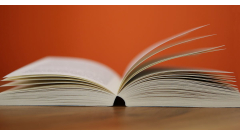Language is a powerful tool, and mastering it requires more than just casual use—it's about honing your vocabulary to express yourself clearly and precisely. Merriam-Webster's Dictionary and Thesaurus offers a comprehensive resource, not only providing definitions but also suggesting synonyms that can elevate your communication skills. This guide will help you unlock the full potential of this invaluable tool, guiding you step by step on how to navigate the intricacies of words.
In this journey of expanding your vocabulary, you'll discover techniques for using the dictionary and thesaurus effectively, ensuring that each word you choose resonates with the clarity and intent you desire. With practical tips and engaging exercises, you'll not only familiarize yourself with the layout of the book but also learn how to incorporate new words into your daily dialogue. Let's dive into the world of words and unlock your linguistic prowess!
Merriam\-Webster's Dictionary and Thesaurus is an essential resource for language enthusiasts and anyone looking to enhance their vocabulary. This handy mass-market paperback, with its extensive definitions and rich collection of synonyms, helps users navigate the nuances of language with ease. Whether you're a student, a professional, or simply love words, this comprehensive guide is designed to make communication clearer and more effective. Dive into the world of words and discover just how powerful your vocabulary can become!
Finding Definitions
Using Merriam-Webster's Dictionary and Thesaurus effectively begins with mastering how to locate a word within the pages of this trusted resource. Start by flipping to the correct section of the book. Upon opening the dictionary, you’ll notice that the words are arranged in alphabetical order. This systematic organization is your roadmap. For instance, if you’re searching for the word "apple," you would locate the section starting with 'A,' then proceed to scan through to find your specific word. This method is straightforward; however, familiarity with the alphabet and the ability to distinguish between letters will significantly expedite your search.
As you find the word, pay special attention to the phonetic spelling provided beside it. Merriam-Webster utilizes a unique phonetic alphabet that guides you through pronunciation. Understanding these symbols can enhance your verbal communication skills immensely. Also, note that some words carry multiple definitions; hence, it is crucial to identify the appropriate meaning relative to the context in which you intend to use it. Each definition may also include usage notes or examples, which facilitate a deeper understanding. To ensure you select the right definition, consider the following:
- Read through the definitions carefully, noting any qualifiers like “informal” or “slang.”
- Be mindful of the part of speech (noun, verb, adjective) to align with your intended usage.
- Check usage examples that accompany each definition to see how the word functions in different contexts.
Exploring Synonyms
Unlocking the treasure trove of synonyms within Merriam-Webster's Dictionary and Thesaurus is a powerful way to enhance your writing and expand your vocabulary. The thesaurus section of this mass-market paperback allows you to delve deeply into the variety of words that can convey similar meanings, offering a nuanced approach to expression. To begin your exploration, identify the word you want to replace. Once you have it in mind, simply look it up in the thesaurus section. You'll find an array of alternatives that vary in subtlety and context.
Segmenting words by context can be instrumental in choosing the right synonym. For instance, the word “happy” could be substituted with “joyful,” “content,” or “elated,” depending on the emotion’s intensity you wish to convey. Each alternative carries a unique connotation, affecting the overall tone of your writing. Understanding these nuances allows you to improve clarity and build a more engaging narrative. Additionally, don't hesitate to explore related words provided by Merriam-Webster. This feature helps draw connections between concepts, offering fresh expressions that might enhance your writing.
- Think critically about the context in which you are using a synonym.
- Consider emotional undertones when selecting an alternative word.
- Utilize the related words section to broaden your vocabulary further.
Understanding Antonyms
Mastering vocabulary using Merriam-Webster's Dictionary and Thesaurus begins with a firm grasp on antonyms—words that express opposite meanings. To locate antonyms effectively within the thesaurus, you can follow a systematic approach. Start by accessing the Merriam-Webster Thesaurus section and enter the word for which you seek the antonym. This not only directs you to the specific entry but also allows you to view a range of synonyms and antonyms associated with that word.
Once you find the antonym, consider the context in which you plan to use it. Words often have shades of meaning that can shift depending on their environment. Here are some tips on how to apply antonyms correctly:
- Evaluate the specific nuances of both the word and its antonym.
- Read example sentences provided in the thesaurus, paying attention to how the antonym fits within different contexts.
- Practice using antonyms in your writing or speech to enhance variety and depth in your communication.
- Experiment by substituting antonyms in sentences to see how the shift changes the meaning and tone.
Engaging with antonyms in this way will enrich your vocabulary and improve your expressive capabilities.
- Regularly revisit the thesaurus to discover new antonyms and solidify your understanding.
- Challenge yourself by writing sentences or short paragraphs that incorporate both a word and its antonym.
- Leverage antonyms to add complexity and contrast in your discussions and writings.
Using Pronunciation Guides
To master vocabulary effectively with Merriam-Webster's Dictionary and Thesaurus, understanding the pronunciation guides is key. The dictionary employs a system of phonetic symbols derived from the International Phonetic Alphabet (IPA) to represent sounds accurately. Familiarity with these symbols allows you to pronounce words correctly, expanding your articulation and communication skills. Begin by locating the pronunciation key usually found at the front of the dictionary; this key explains the phonetic symbols utilized throughout the entries.
Common symbols you will encounter include:
- /æ/ as in "cat," which denotes a short "a" sound.
- /iː/ as in "see," indicating a long "e" sound.
- /ʌ/ as in "cup," representing the short "u" sound.
- /ɔː/ as in "saw," signifying a long "o" sound.
- /θ/ as in "think," representing the voiceless "th" sound.
Once you familiarize yourself with these symbols, practice by reading examples from the dictionary. Identify words, break them down into their phonetic components, and pronounce them aloud. Consistent practice with the pronunciation guides in Merriam-Webster's Dictionary and Thesaurus enables you to improve not only your vocabulary but also your verbal confidence.
- Utilize audio resources: Many online versions of the dictionary offer audio pronunciations.
- Record yourself: Listen to your pronunciation and adjust based on the guides.
Learning Word Origins
To effectively navigate Merriam-Webster's Dictionary and Thesaurus and uncover the stories behind words, you’ll want to start by exploring the etymologies provided for each entry. When you look up a word, the etymology typically appears near the beginning of the definition, often prefaced with "from" or "origin." This section reveals the word's origins, including its roots in ancient languages such as Latin, Greek, or Old English, shedding light on how it has evolved over time. Understanding this history not only enhances your appreciation for the word but also deepens your grasp on its current nuances and connotations in the English language.
Recognizing the significance of a word’s etymology can lead to greater comprehension and usage in various contexts. For instance, if you consider the word “benevolent,” knowing that it derives from Latin—where "bene" means good and "velle" means to wish—makes it easier to infer its meaning of being well-meaning or kindly. By tracing the roots of words, you can often make educated guesses about new vocabulary, even if you've never encountered the word before. To maximize your understanding, consider these tips:
- Look up unfamiliar words to find their etymological roots.
- Study related words that may share the same origin.
- Create flashcards with the word on one side and its etymology on the other.
- Incorporate newly learned words into your daily conversations for better retention.
Utilizing Example Sentences
Merriam-Webster's Dictionary and Thesaurus is a powerful tool for anyone looking to master vocabulary effectively. One of its standout features is the inclusion of example sentences for definitions, which can greatly enhance your understanding and application of a word. These sentences provide context, showing how a word is used in a real-world scenario. The way words function in sentences can differ based on their usage—be it as a noun, verb, or adjective. By observing these examples, you gain insight into nuances like tone and connotation, helping you choose the most appropriate word for your needs.
Incorporating the new vocabulary you learn into your writing can elevate your communication skills. It is beneficial to create your own sentences using the new words after seeing them in use. This practice reinforces your understanding and makes the vocabulary stick. Also, consider the following practices:
- Write a short story or paragraph using five new words from the dictionary.
- Participate in language games that encourage the use of newly learned vocabulary.
- Keep a vocabulary journal where you note down new words, their meanings, and example sentences.
Identifying Word Forms
Using Merriam-Webster's Dictionary and Thesaurus can significantly enhance your vocabulary and understanding of the English language. One of the essential skills to master is identifying different forms of a word. This task involves recognizing how a word can function in varying contexts, as it may take on multiple roles – such as nouns, verbs, adjectives, and even adverbs. To begin this process, locate the word you wish to explore in the dictionary. You'll find a list of its definitions along with grammatical labels that indicate its part of speech. For instance, a word like "decide" will display its use as a verb, while "decision" will appear as a noun. Understanding these distinctions is crucial when choosing the appropriate form for your writing or speaking.
Additionally, context plays a vital role in selecting the right form of a word. Identifying the word's function in a sentence can aid in determining the most suitable option. Utilizing the usage examples provided in the dictionary can help reinforce this concept. For example, seeing "happy" as an adjective in a sentence can guide you to use it when describing a noun. Furthermore, do not overlook synonyms and antonyms found in the thesaurus section, which can provide alternative word forms that may better fit your intended meaning. As you practice, consider the following tips:
- Check the part of speech before using a word to ensure it fits grammatically in your sentence.
- Analyze the context to decide between similar forms, such as "choose" (verb) and "choice" (noun).
- Explore related entries in the thesaurus for various nuances of meaning and usage.
- Learn how prefixes and suffixes alter a word's form and meaning for more versatility in language use.
Related Products
Enhancing Creative Writing
Utilizing Merriam-Webster's Dictionary and Thesaurus is a game-changing strategy for elevating your creative writing projects. This resource provides not just definitions but also an extensive bank of synonyms and antonyms that can invigorate your language and enhance the emotional resonance of your writing. To make the most of this tool, begin by identifying words that feel too mundane or overused in your drafts. Aim for a specific emotional tone or image you want to evoke in your readers, and then explore the thesaurus for synonyms that can provide a richer, more vivid alternative. For example, instead of using "happy," you might find "elated," "jubilant," or "content." Each of these words carries its own nuances, allowing for a more tailored expression of your characters' emotions.
Beyond just substituting words, become adept at brainstorming ideas based on antonyms or closely related terms. This can offer fresh perspectives on themes, character development, and plot dynamics. Challenge yourself to create a word map where you branch out from a central idea, noting synonyms and antonyms that can serve as prompts for plot twists or character arcs. Use the dictionary to drill down into precise meanings, ensuring that you fully understand the implications of the words you choose. Incorporate them into your writing with intention, crafting sentences that sparkle and resonate deeply with your audience. Consider these techniques as you delve into your creative endeavors:
- Experiment with word substitution to breathe new life into clichéd phrases.
- Create character profiles utilizing varied synonyms to reflect their unique voices.
- Employ antonyms to develop conflict and contrast in your narrative.
- Compile a vocabulary list of powerful words alongside their definitions for quick reference.
Building Spelling Skills
Utilizing Merriam-Webster's Dictionary and Thesaurus is a powerful way to strengthen your spelling skills. This trusted resource is not just a reference tool for definitions; it also offers invaluable insights into correctly spelling words, especially those that are challenging. When you encounter a word you’re unsure of, looking it up can clarify the correct spelling as well as provide you with its phonetic pronunciation. This feature allows you to practice how to say the word, reinforcing your memory of its spelling through auditory learning. Whenever you write and find yourself hesitating on how to spell a word, take a moment to look it up rather than guessing; this habit leads to improved spelling accuracy over time.
In addition, frequent use of the dictionary aids in vocabulary expansion, which often accompanies better spelling. Words with similar roots or affixes can be found in the thesaurus, giving you a broader understanding of how similar words are spelled. Engaging with the thesaurus can enhance your understanding of word origins and their respective spelling patterns. Consider these strategies:
- Make it a daily routine to look up at least one new word and its spelling.
- Write down tricky words you’ve learned and practice spelling them aloud.
- Create flashcards with words on one side and their definitions and phonetic pronunciations on the other.
- Challenge yourself to use new vocabulary words in your writing or daily conversations.
- Explore words related to your interests in the thesaurus; this will make learning more enjoyable and relevant.
Developing a Learning Routine
Building a consistent vocabulary-learning habit with Merriam-Webster's Dictionary and Thesaurus can dramatically enhance your language skills. Start by establishing a structured daily routine dedicated to vocabulary practice. Choose a specific time during your day—morning, afternoon, or evening—when you feel most alert. This routine should ideally last 15 to 30 minutes, allowing you to fully focus on both new and familiar words. Consider setting clear weekly goals to learn a certain number of new words, such as five or ten, from the dictionary. Use the thesaurus to explore synonyms and antonyms for each new word, which will deepen your understanding and expand your vocabulary horizons.
Incorporate various activities into your routine to keep the learning process enjoyable and engaging:
- Choose a 'word of the day' from the dictionary and use it in different sentences throughout the day.
- Each week, pick a thematic vocabulary group (like emotions, nature, technology) and focus on words related to that theme.
- Create flashcards for challenging words, including their definitions, synonyms, and example sentences, to reinforce your memory.
- Engage with online vocabulary quizzes or apps that utilize Merriam-Webster resources for additional practice and reinforcement.
Why We Chose This Product
This guide was chosen to shine a spotlight on Merriam-Webster's Dictionary and Thesaurus because it represents a trusted source in the evolution of language. Renowned for its accuracy and depth, this resource empowers individuals both young and old to broaden their vocabulary effectively. By mastering the use of this dictionary and thesaurus, you are investing in your personal and professional growth.
- Broad range of vocabulary
- User-friendly layout
- Rich in examples and context
- Develops critical thinking about language
- Compiles both basic and advanced linguistic resources
Choosing to explore this guide means embarking on a path towards better communication. With Merriam-Webster at your fingertips, you can build a more robust vocabulary that will serve you in countless situations. Remember, every word is an opportunity—let’s seize it!
Merriam-Webster's Dictionary and Thesaurus is an essential resource for language enthusiasts and anyone looking to enhance their vocabulary. This handy mass-market paperback, with its extensive definitions and rich collection of synonyms, helps users navigate the nuances of language with ease. Whether you're a student, a professional, or simply love words, this comprehensive guide is designed to make communication clearer and more effective. Dive into the world of words and discover just how powerful your vocabulary can become!










